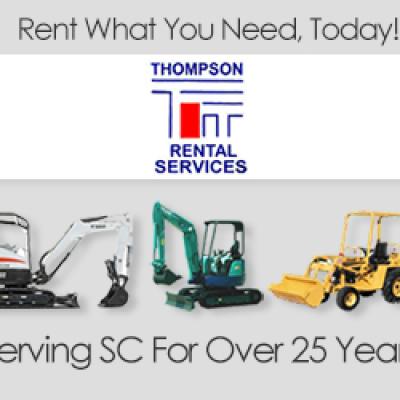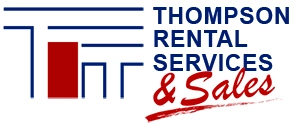
How do you decide when to buy construction equipment and when to rent what you need?
Whether you’ve got some big contracts up ahead, you’re expanding your company’s capabilities or you just need to replace your current heavy equipment, there are a number of factors to consider when it comes to acquiring construction equipment for your commercial construction company. Trying to decide if you should buy or rent the equipment can be a headache in itself.
There are several things to consider before jumping in one way or the other when it comes to buying or renting big, expensive, earth-moving equipment. With pros & cons to both, it’s worth taking the time to consider your company’s current situation, future plans, and figuring out which will be the most advantageous to your business.
We’ve composed this list of 10 important considerations to help you get started.
1. Consider Your Current And Future Financial Situation
Look at your current financial situation to decide if you have the capital to buy the construction equipment that you need, or if renting may be a better option. Look beyond your current situation and project your costs over several months or years for both purchasing and renting, then compare the two. Buying may be a larger one-time financial burden, but the cost of renting can add up quickly, and over a long period of time it could end up costing you more. Not to mention, when you own, you will see a return on your investment when you sell.
2. Compare the Cost of Ownership and Cost of Renting
Estimate the cost of owning your own equipment and compare it to the cost of renting the equipment. Ownership means maintenance and operating costs, insurance and other fees such as government licensing. These costs vary from machine to machine so it’s important to calculate it and see if it’s still in your budget or not. Fuel is a cost for both owning and renting that needs to be considered. Roughly, one-third of your total expenses will be for the cost of fuel. Talk to your financial advisor about the possible tax implications (or advantages) of buying or renting equipment for your business. Tip for U.S. equipment owners: you may be able to avoid paying capital gains tax when you sell and buy equipment for your business.
3. Consider The Length of Your Project or Frequency of Jobs
How often this piece of equipment will be used could be the deciding factor in whether you rent or buy the construction equipment that you need. If it’s a short term job or one-time thing, then renting probably makes more sense. If you’re working on a long project, or if you’ve got several jobs coming up, then buying could make sense. If it’s a multi-purpose piece of equipment (loaders, excavators, skid steers, forklifts, trucks etc.) that can be used as an asset on any jobsite could be worth investing in.
4. Consider Risks of Equipment Availability
When you plan to rent equipment, there is always the potential risk of a rental company not having the machine you need when you need it. Taking on jobs without planning notice and changes in project schedule could be more detrimental to your business than you think. The big advantage of owning your own equipment is that it’s yours - available to you 24/7. You can react to unexpected changes in projects or project schedules, take on last minute jobs and complete projects with less downtime.
5. Keep in Mind Fleet Management and Inventory Control
Before jumping into to owning your own fleet of equipment or new equipment, you should always consider equipment management and inventory control. Do you have the skills and the time, or the employees to take care of insurance, maintenance, etc? If you don’t, you may want to pay a little extra to rent.
6. Consider Tax Time
Talk to your accountant or bookkeeper, someone with experience who you can trust, and figure out where you will stand at tax time if you purchase or rent this piece of equipment. Rental expenses can sometimes be deducted as a business expense. Buying a piece of construction equipment, however, is a capital expense that must be treated as such at tax time. You can't deduct the entire expense during the year in which it was purchased. The capital costs are then depreciated over the useful life of the piece of equipment. You may be able to leverage a depreciation deduction for the equipment you have purchased for your business.
7. Consider and Compare Interest Rates
Equipment manufacturers and dealers are always working to provide business owners with low financing to make it more attractive to buy equipment. Do your research to see if now is a good time to be with low interest rates. Shop around a find a financing option that is right for you. If interest rates are really high right now, you may be better off renting until rates go down.
8. Be Aware of Depreciation/Resale Value
Do your research on the different brands and models before you decide to purchase the construction equipment that you need. Some may hold their value better than others and will be a better investment for resale value. Buying quality used equipment can be a good option too. If you know you may be selling in the future, selecting the right equipment based on annual depreciation and performance might be the financial difference that helps you decide to rent or buy.
9. Factor In Transportation Costs
We’ve discussed some financial considerations already, but transportation cost is one expense that many contractors overlook. How far are you planning to travel for jobs and what is it going to cost to transport this equipment? After the costs of the truck, the driver and diesel fuel are considered, would it make more sense to rent equipment at the job location than to transport it?
10. Consider Purchasing New or Used Construction Equipment
Both new and used construction equipment have their advantages and disadvantages. Once you’ve determined your budget and all of the items listed above, you should have an idea of where you stand. Maybe you thinking purchasing would be a better fit than renting, but aren’t sure if you can afford it or not. If you’ve determined that the heavy equipment that you need is way over what you can afford, look at a trusted used dealer like Thompson Rental Services. They can help you figure out what you can afford. New or used - always inspect the equipment before purchasing. Take the equipment for a test run to see how it handles and listen for odd noises. Have a trusted certified mechanic look it over and make sure it is mechanically sound.
Some extra precaution before purchasing will save you many big headaches later.
If you need new, used or rental construction equipment, call us at (803) 736-7368. If you have any difficulties getting through our phone system, please use our Contact Form.
We have hundreds of construction equipment for sale or rent including: Toro, ASV, IHI/Kato & More. We carry parts for Toro construction products, ASV loaders, IHI/Kato Mini Excavators, Bomag light construction products, and various other equipment that we sell. We service all equipment that we sell. We do offer field service as well. Our sales professionals will be glad to assist you. Please visit one of our three construction equipment dealer locations.
Besure to ollow us on Facebook and Twitter, and sign up for our Free Monthly Newsletters.

